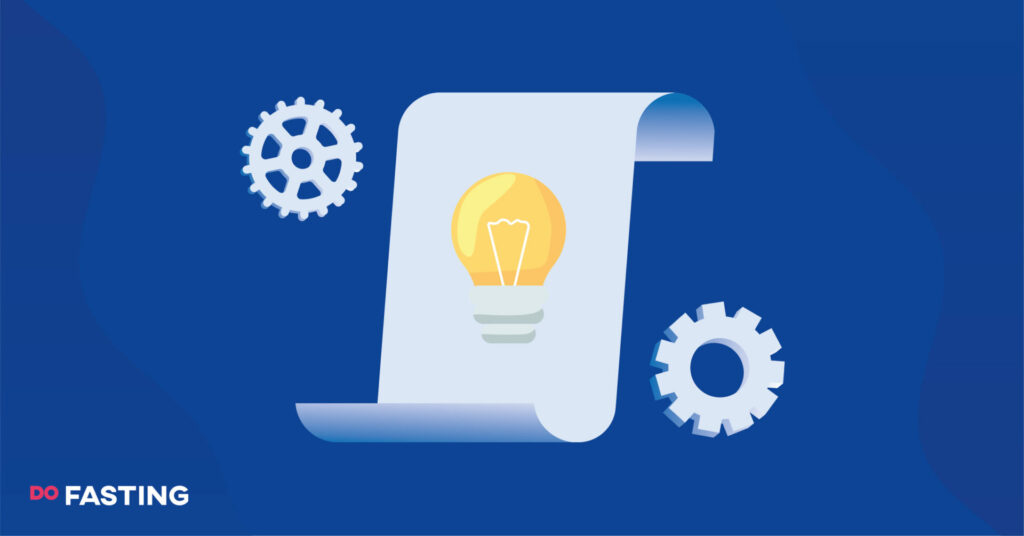Contents
How Does Intermittent Fasting Work?
Intermittent fasting is a time-restricted eating plan which involves fasting and eating periods. There are many different kinds of intermittent fasting that require different fasting lengths.
The easiest method of intermittent fasting is the 12-hour fast. A typical 12-hour fast would require you to stop eating at 8 PM, go without food for 12 hours, and then begin eating again at 8 AM the following morning.
Other intermittent fasting methods include the 14:10, 16:8, and 18:6 methods as well as the Warrior Diet, the 24-hour fast, alternate day fasting, and the 5:2 method.
IF has many health benefits, including reducing inflammation, increasing autophagy and longevity, weight loss, and improved mental clarity. It is also thought to improve brain function and protect against neurodegenerative diseases like Alzheimer’s disease.
If you’re concerned about sticking to this dieting method, you could try out the DoFasting app to help you on your way. The DoFasting app is designed to help make fasting easier for you. It tracks your fasts, reminds you when your next fast is, and provides space for you to keep a note of your food and caloric intake.
You’ll also find workouts that are suitable for this dieting method and recipes to help you eat a healthy and balanced diet when trying out IF. If you struggle to stick to your fast, you could even join the community of other fasters and get tips and tricks from others on your fasting method.
Take a
1-minute quiz
and discover how much weight you can lose with DoFasting!

5 Ways Intermittent Fasting Affects the Health of Your Brain
IF is thought to have a significant impact on your brain cells and may help boost overall brain health. Below, we have taken a look at the ways this dieting method can improve brain function.
1. Helps detoxify the brain
Increased autophagy is a side effect of prolonged fasting. Fasts are helpful in promoting metabolic switching to ketosis – the state in which your body burns fat for fuel rather than blood glucose – and this state helps to induce increased autophagy.
Autophagy literally means self-cleaning and is the process by which cells are recycled and regenerated. This process helps the brain to detoxify by encouraging the regeneration of new brain cells to replace old, defective, or damaged cells.
Autophagy helps to clear out old cells and sweep away the debris. It decreases as we age, and reduced autophagy has been linked to a number of neurodegenerative diseases. By fasting, you’re increasing the autophagy in your brain and therefore reducing your risk of developing a neurodegenerative disease.
2. Improves your memory
Studies have shown that IF may actually improve your memory. Researchers found that fasting for four weeks helped improve memory capacity and boost performance in spatial and memory tasks. A study on mice has shown similar results.
3. Improves emotional wellbeing
Fasting may be an effective tool for improving mental health and wellbeing. Indeed, studies have shown that fasting and caloric restriction helps to improve overall mood as well as mental health conditions, like depression.
4. Helps with various chronic diseases
Fasting may increase the presence of the brain-derived neurotrophic factor which can be linked to reduced degeneration and degradation and could help protect against a number of chronic diseases.
5. Reduces inflammation
IF is known to help reduce inflammation which can directly impact maintaining brain health. Inflammation has been linked to many chronic illnesses, including neurodegenerative diseases.
Other Ways Fasting Helps Your Health
Intermittent fasting is a top-rated eating plan because of the number of benefits it offers. We’ve listed some of them below.
Helps control blood sugar
Intermittent fasting is a good method of eating for those with type 2 diabetes. This is because it helps you regulate your blood glucose levels better and may even increase insulin sensitivity, allowing your body to maintain healthy levels of blood glucose.
Those with diabetes should speak with a doctor before trying out a new diet to ensure it is safe for them.
Take a
1-minute quiz
and discover how much weight you can lose with DoFasting!

Lowers blood pressure
Intermittent fasting is also considered effective in lowering blood pressure. Many people who suffer from hypertension are told to monitor their food intake, but when you eat could also have as much effect as what you eat.
Burns excess fat
Time-restricted eating is an effective weight reduction method and has been shown to help many people reduce their body weight. During extended periods of fasting, the body switches to the metabolic state of ketosis. During ketosis, the body burns fat instead of using blood sugar for fuel.
This metabolic switch allows excess fat to be burned. However, it can only be achieved through fasting for extended time periods. Indeed, ketosis begins during fasting periods that exceed 12 hours.
Foods That Help Your Brain During Intermittent Fasting
You should eat certain foods during your eating window to help eliminate brain fog and cognitive impairment, and also boost brain health. These include:
- Dark, leafy greens. Greens like kale, spinach, and collard greens are rich in vitamin K, folate, and lutein. These vitamins and minerals are thought to prevent mental decline. Try adding more greens to your diet when you practice intermittent fasting.
- Fatty fish, like anchovies, mackerel, salmon, and tuna. These kinds of fish are rich in healthy fats and omega-3 fatty acids. Studies suggest that these fats have neuroprotective properties and may reduce the risk of developing neurodegenerative disease.
- Berries. Flavonoids, the plant pigments that give berries their colors, are thought to promote better cognitive function and reduce inflammation in the brain.
Studies suggest that loading your plates with these foods may help improve brain health and cognitive function, as well as reduce the risk of developing a neurodegenerative disease.
Many of these foods are found in the Mediterranean diet, which is a good dieting method to follow during intermittent fasting.
Should You Start Intermittent Fasting Now?
Though there are many benefits of fasting and it may be found as part of religious practices, some people should not try it out. These include:
- Those who are pregnant or breastfeeding
- Anyone with a history of eating disorders as fasting may promote disordered patterns of eating
- Anyone taking medications that have to be taken with food or that would be affected by long periods of fasting
- People with sleep problems as fasting may interrupt sleep
- Anyone with a chronic illness that may be affected by fasting
Those with diabetes should speak with a doctor before trying out this method of eating. It is thought that diets like intermittent fasting help diabetes patients, but you need to ensure that it is safe for you before starting out.
Take a
1-minute quiz
and discover how much weight you can lose with DoFasting!

Conclusion
Intermittent fasting has been shown to help obese individuals lose weight easily and is a popular way of losing weight. However, weight loss is not the only benefit you can expect. IF can reduce inflammation, improve your mood, and support better blood sugar regulation.
Furthermore, it may also have a positive effect on your brain. It can reduce the risk of cognitive problems and neurodegenerative diseases while improving memory and brain function.
Leave a Reply
See how DoFasting will improve your life
Find out what works for you with this 60-sec quiz approved by our experts and get your personal revolutionary fasting assistant.
Start the Quiz















6 Comments
Heya i’m for the first time here. I came across this board and I find It
really useful & it helped me out a lot. I hope to give something back and help others like you helped me.
Thank you and welcome!
Pretty component of content. I simply stumbled upon your weblog
and in accession capital to assert that I acquire
actually enjoyed account your blog posts. Anyway I’ll be subscribing to your augment or even I fulfillment you get entry to consistently fast.
Thank you very much for your feedback!
Very interesting subject, regards for posting.
It really is and many thanks for reading!